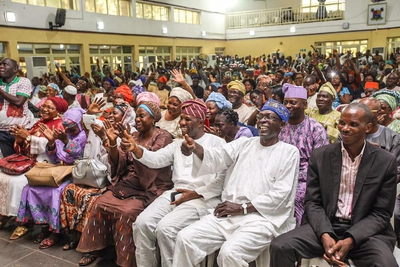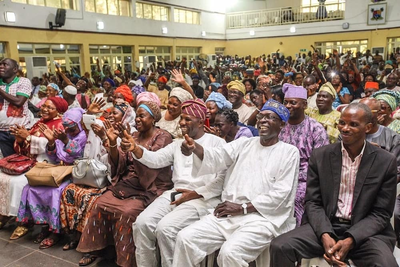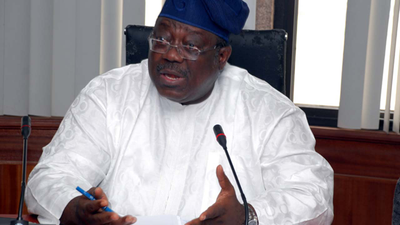The Civil Service Reform of the Federal Government by Valentine Uwakwe (See Source)
ANALYSE THE CIVIL SERVICE REFORM OF THE FEDERAL GOVERNMENT
Introduction
The civil service in Nigeria has emerged over the years as the most critical and crucial part of national development and democratic stability. The Nigerian Civil Service consists of employees in Nigerian government agencies other than the military. Most employees are career civil servants in the Nigerian ministries, progressing based on qualifications and seniority. Recently the head of the service has been introducing measures to make the ministries more efficient and responsive to the public.
History
The Nigerian Civil Service has its origins in organizations established by the British in colonial times. Nigeria gained full independence in October 1960 under a constitution that provided for a parliamentary government and a substantial measure of self-government for the country’s three regions. Since then, various panels have studied and made recommendations for reforming of the Civil Service, including the Margan Commission of 1963, the Adebo Commission of 1971 and the Udoji Commission of 1972-74. A major change occurred with the adoption in 1979 of a constitution modeled on that of the United States. The Dotun Philips Panel of 1985 attempted to reform to the Civil Service. The 1988 Civil Service Reorganization Decree promulgated by General Ibrahim Babangida had a major impact on the structure and efficiency of the Civil Service. The later report of the Ayida Panel made recommendations to reverse some of the past innovations and to return to the more efficient Civil Service of earlier years.The Civil Service has been undergoing gradual and systematic reforms and restructuring since May 29, 1999 after decades of military rule. However, the civil service is still considered stagnant and inefficient, and the attempts made in the past by panels have had little effect.
In August 2009 the Head of the Civil Service, Stephen Osagiede Oronsaye, proposed reforms where permanent secretaries and directors would spend a maximum of eight years in office. The reform, approved by President Umaru Yar’Adua, would result in massive retirement of Permanent Secretaries and Directors, many of whom are from the North Stephen Oronsaye has said that his goal is for the Nigerian civil service to be among the best organized and managed in the world.Oronsaye retired in November 2010 at the statutory age of 60 and was succeeded by Oladapo Afolabi.
WHAT IS CIVIL SERVICE?
In generic terms, the civil service is an employment system that is based on hiring, retaining and promoting employees on their qualifications and ability to the work. According to Encarta World English Dictionary (1999.349) civil service constitute all government departments of a state and the people who work in them. Specifically, civil service has been described as an institution which has the pivotal role of carrying out (and advising on) government policies (Tijjani Muhammed Bande (2001.1). The civil service in the words of Emeka Emmanuel Okafor (2005.67), is also seen as that apparatus of government designed to implement the decision of political leaders. Political leaders make policy, the civil service executes it and if the civil service lacks the capacity to implement the policies of the political leadership, those policies, however well intended will not be implemented in an effective manner.
The civil Service Hand book (1997.17) is more emphatic. It describes civil service as a body or organ which enjoys continuity of existence. Its members are not limited to a short term of office. When a civil servant relinquishes his office for whatever reason his place is taken by another person who similarly enjoys security of employment. Civil servants according to the Handbook command a pool of experience and know-how for implementing government policies. It recognises that while the civil service is the instrument of the government of the day, the service and its members are not permitted under the law to be partisan of any political party. The civil servant is also required to assist in formulating and implementing the policies approved by the government irrespective of its personal or private opinions or attitudes towards such policies. Another feature of civil service is that it is indispensible irrespective of the type of government in power (whether military or democratic regime).
EVOLUTION OF CIVIL SERVICE
The Nigerian civil service is one of those institutions created by the colonial government to facilitate the achievement of resource expropriation and maintenance of law and order. Pursuit of national development was not part of their agenda.
Between 1900 and 1950, the Nigeria civil service was under the control of the British Colonial technocrats and general administrators. But there was a change of guard during the first Republic.The period between 1966 and 1976 witnessed a number of radical changes in the role of Nigeria civil servants. During that period, the civil servants were in control of government political process due to the emergence of military rulers in political administration prevailing in the African continent then, coupled with their lack of experience of political leadership in governance. Generals Ironsi and Gowon governments for example, relied heavily on the civil servants for the discharge of their duties (Lukman 1971 : 2002 2004) This situation provided opportunity for civil servants to get involved in anti-democratic ethos which led to civil servants being accused of engaging in grafts, indolence and redundancy which led to the disengagement of about ten thousand civil servants under the Murtala/ Obasanjo regimes.
The democratic government of the second republic came with a total destruction of the service as the entire civil service was politicised, polarised and factionalised which led to the struggle for supremacy between politicians and civil servants. This situation prompted the introduction of reforms in the civil service to reposition the administration of the service.
REFORMS IN THE CIVIL SERVICE
The civil service has under gone several reforms from the period of colonialism through military regimes up to the current democratic administration in Nigeria. Some of the reforms include: Tudor Davis and Harragin commission of 1945 & 1946 which reviewed the wages and general condition of service in the civil service. The Corsuch Commission of 1951 which was charged with enquiring into the structure and remuneration of the public service. The Udoji Public Service Review Commission of 1975 which introduced the unified Grading and Salary structure in the Service.
The civil service reform of 1988 through Decree No 43 of 1988. Among all the reforms, the 1988 reform was the most elaborate. It was meant to achieve the following objectives:
- Enhance professionalism, decentralisation and delegation of functions,
- Institute checks and balances
- Promote general modernisation
- Enhance the combination of responsibility with authority
- Align the civil service with the spirit of Executive Presidentialism
- Enhance efficiency, effectiveness and speed of operations( Philips 1990, 1989, 1988)
On the other hand, the Nigerian reform efforts have been vitiated or undermined by lack of strong concurrence between the desire to reform and those charged with the governance of the country. This then makes the issue of political configurations critical. The reforms have sought to improve the performance of the civil service through managerial and structural reforms by exploring ways of making them catalysts of change. They include:
(i) The Public Service Reform of 1974/75:
This was perhaps the first reform of the whole of the Nigerian public service (the civil service, parastatals, local governments). First, it harmonised and unified job grading and salary scales throughout the public service. Instead of the multitude of grading and salary systems, it replaced these with a 17- step Unified Grading and Salary Structure (UGSS). Second, it fixed a minimum pay for all public officers, with the results that public servants’ salaries were substantially upgraded to keep pace with inflation. Thirdly, it made a strong case for introducing private sector management methods into the public service as a way of introducing a new approach to management in the public sector. The most important among these methods were management by objectives (MBO), Project Management (PM), Plans, Programme and Budgeting System (PPBS) and the Open Reporting System to replace the confidential reporting system in use up till that time. It made a strong case for the creation of a senior management group within the civil service which should be the focus and chief promoter of these changes, and see policy making and the management of change as its primary responsibilities. Fourthly, the reform made a case for the introduction of a new code of conduct for all public officers and instituted the public complaints commission and the anti-corruption bureau. Finally, in order to ensure that new management orientations were inculcated by all line and staff, a very elaborate programme of training and retraining was put in place. The reform was quite ambitious both in terms of coverage and the substance and range of the measures it canvassed.
(ii) The Reform of Local Government, 1976.
Local government was one of the institutions included in the 1974/75 public service reform. The government then embarked on a global and comprehensive reform of local governments. The reform re-defined local governments and changed their orientation from field administrations of the state governments to being semi-autonomous local government structures that were responsible to their local electorate. Increasingly, local governments, both under civilians and military administrations were largely appointed by state or federal government. Some state governments cancelled or took over local government revenues or denied them their entitlements. The local government units have therefore been as distant and artificial as the state or national government units.
(iii) Reform of largely Parastatals, 1986- 1993.
Estimates of the total number of public enterprises (PEs) in Nigeria in the early 1980s range from 600 to 1,700, depending on how one defines them and whether or not one includes state government PEs. The rapid growth of PEs has been fuelled in Nigeria by the phenomenal rise in oil revenues, with practically all of the royalties accruing to the central government. PEs were perceived as instruments for controlling the ‘commanding heights of the economy’ as stipulated by the 1979 constitution but also for indigenising the economy, mobilising resources in terms of jobs and capital and administer ‘natural’ monopolies. The major problem, however was that these parastatals were so poorly managed, as several commission reports revealed. The primary reason was that the boards of management of these organisations were usually filled with party stalwarts, or heads of civil service agencies or retired army generals (under military rule) without respect to their qualifications, competence and background. There were also problems with respect to conflicting objectives of parastatals, poor financial and personnel management practices, poor record keeping and lack of attention to productivity.
A. WHY IS IT IMPORTANT TO TEACHING AND LEARNING
It is important to teaching and learning because all this reforms were intended to improve on the character of work ethics and values in the civil service. Such values and ethos directly affect the individuals who perform duties as civil servants guided by the rules of the service.
B. THE RELEVANT OF SYSTEM APPROACH TO THE PRODUCTION MANAGER
The relevance of the system approach to the production manager can be stated below;
- it calls for division of labour to enable workers know their quota as well as boast production rates
- it makes the production manager to be instructive as to the day to day activities in the firm
- there will be an increase in production capacity since all activites follows due process by passing from one stage to the other.
- the approach enable the production manager to take inventory of daily production capacity as well as determine the rate of production.
C. THE IMPACT OF MANAGEMENT INFORMATION SYSTEM ON BUSINESS ORGANISATION IN OIL COMPANIES IN RIVERS STATE.
The impact of management information system on business organization in oil companies in Rivers state cannot be over emphaised. This impact can be outline below.
- it has ensure transparency in the oil industry
- it has ensure adequate data capturing and analaysis of information received
- it has also ensure the best use of GPS,GPRS and PHOTOIMAGERY to improve oil production capacity in Rivers state and the country in general.
- it has ensure and enable the various oil companies in the state to be link or connected to the outside world by ensuring that all activities in the nation’s oil and gas sector are done in accordance with laid down principles,policies and laws.
- it has increase awareness in the sector especially as it relates to our upstream and downstream sectors in the state and the federation as a whole.
CONCLUSION
The civil service rules embody the underlying ethics, Values and ethos upon which service must necessarily run on. Divided loyalty in civil service can crumble an institution of government as it breeds disunity, mismanagement of public position and leadership crisis. It can be stated clearly that loyalty in service implies faith in the system.
To have divided loyalty in the system is to adopt the view that you know better than those above you in the chain of authority who know what should and should not be done. In other words, to have divided loyalty is to lose faith in the system and to place self before the service. Often, this attitude begins with leaders (those in authority). If a leader resorts to the temptation to doubt the system, then subordinates may follow suits.
We therefore, hold the view that the strict observance of civil service rules and its application in the discharge of our duties as civil servants will no doubt contribute in repositioning the civil service and bring harmony and peace in the system.
Today, the National Assembly Management is undergoing massive transformation as both Management and Staff are imbibing a new code of ethics and exhibiting high level discipline. There is no doubt that the future of the institution lies in the hand of the Leadership and staff and the new positive attitude of the staff indicate that the Legislature is heading to the right direction.






